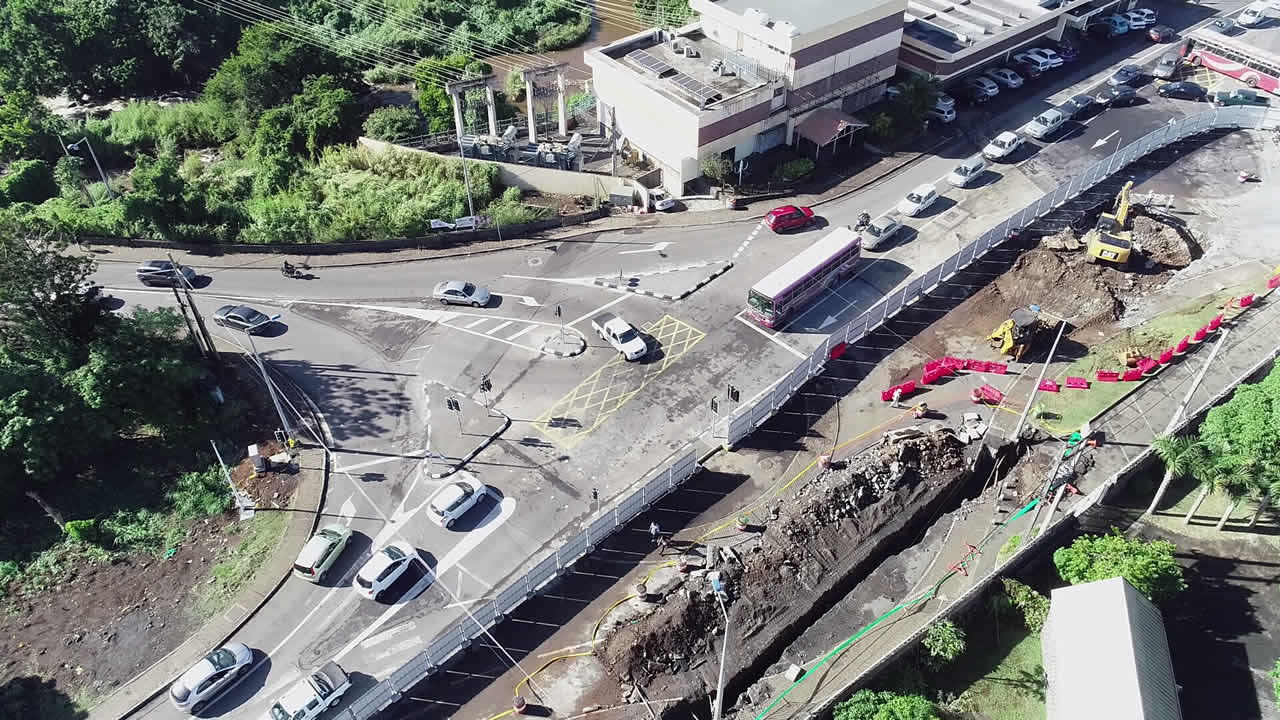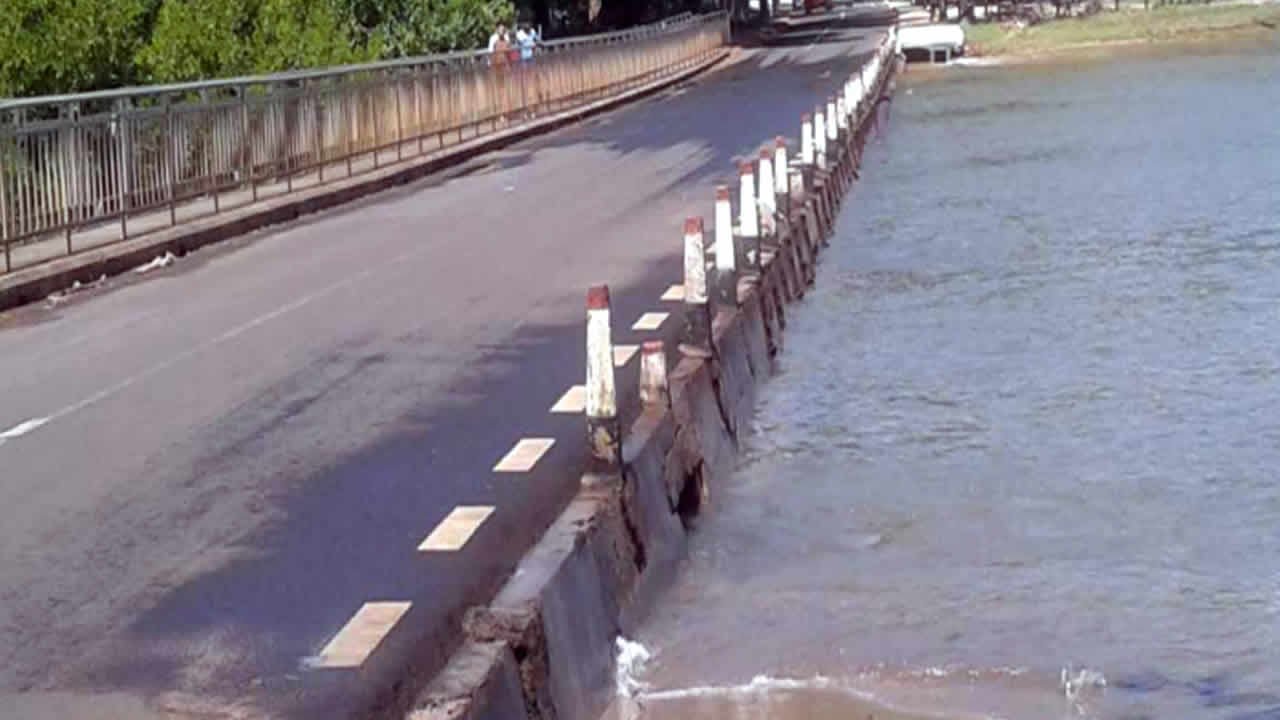
Major infrastructural projects are gathering pace across Mauritius. Though some projects are causing inconvenience to the public, many people find solace in the fact that their patience will not go vain, as the country is on a major upswing to enhance our standard of living.
Major projects are currently underway across the country. The Road Decongestion Program, launched more than ten years ago, is in full swing with various major projects which will, along with the Metro Express, transform the landscape of Mauritius. Other public projects include hospitals, bridges, flyovers and public buildings. In addition to the construction of new roads, there is also the rehabilitation of existing roads, upgrading of drains and pavements and widening of the motorway.
These projects have a considerable impact on the economy, not only creating jobs and opportunities but also enhancing our infrastructural capacity to sustain higher magnitudes of development and economic activity, thereby spurring further economic growth. Moreover, the country improves its attractiveness as an ideal investment destination.
However, rising demand for building materials and ancillary services are having a bearing on prices. The latest Construction Price index shows an increase of 0.3 point (0.3%) during the second quarter of 2018 to reach 118.8 in June 2018. During the second quarter of the year 2018, increases were noted in “Materials” sub-index (0.9%) and “Hire of Plant” sub-index (0.2%). It is worthy to note that the “Labour” and “Transport” sub-indices remained unchanged.
This can be explained by higher recourse to foreign labour but also greater use of machinery and equipment requiring less labour. The booming construction sector has also induced an increase in the number of trucks on our roads, from 14,243 in 2014 to 15,234 as at 30 June 2018. With other productive sectors like manufacturing and agriculture on a declining trend, the economy is banking heavily on the construction sector to achieve a higher growth this year. Growth in the construction sector is estimated at 9.5% this year.
Phoenix new junction
 This is a major project that has been under discussion since long. Finally the authorities have decided to come up with the construction of grade separated junctions at Pont Fer/Jumbo/Dowlut roundabouts in Phoenix. The flyovers are designed to ensure better integration with the metro express which will also cross the area. This project is the first Government to Government contract agreement between Mauritius and South Korea for consultancy services for the design of the roundabouts. The project consists of a viaduct along the M1 over the Phoenix roundabout with 2 lanes in each direction and a viaduct over the Jumbo & Phoenix roundabout for the 2 northbound lanes. Additionally, the Dowlut roundabout will be replaced by a direct connector between Port Louis and Curepipe in order to ensure uninterrupted traffic flow.
This is a major project that has been under discussion since long. Finally the authorities have decided to come up with the construction of grade separated junctions at Pont Fer/Jumbo/Dowlut roundabouts in Phoenix. The flyovers are designed to ensure better integration with the metro express which will also cross the area. This project is the first Government to Government contract agreement between Mauritius and South Korea for consultancy services for the design of the roundabouts. The project consists of a viaduct along the M1 over the Phoenix roundabout with 2 lanes in each direction and a viaduct over the Jumbo & Phoenix roundabout for the 2 northbound lanes. Additionally, the Dowlut roundabout will be replaced by a direct connector between Port Louis and Curepipe in order to ensure uninterrupted traffic flow.
- Project cost: Rs 1.5 billion
- Contract awarded on 27 February 2018
- Start of works: 30 March 2018
- Duration: 958 days
- Consultant: Korea Expressway Corporation
- Contractor: Transinvest GCC Bouygues Joint Venture
Metro Express: Will it be eco-friendly?

MP Osman Mohamed, former Chairman of the Maurice Ile Durable, recently asked a Parliamentary question on the ecological features of the Metro Express. Transport Minister Nandcoomar Bodha stated in Parliament that the Light Rail Vehicle (LRV) is designed to be eco-friendly and energy efficient, with no pollution and greenhouse emission. It will have Energy Saving devices for a lighting control system with occupancy sensors, timers. High efficacy LED light fixtures will be used in the Metro Stations and the buildings. Regenerative braking will be utilised for the LRV to conserve energy.
Electricity will be sourced from the grid. Also, energy conservation by the Variable Refrigerant Volume will be achieved for air conditioning in office buildings. The trains are designed with materials selected based on their recyclability and ease of dismantling at the end of their operating life; and also according to the functional, technical and regulatory requirements as per the contract, which have been drafted by the Singapore Cooperation Enterprise. The requirements are as per the established international best practice standards which can be compared to those applicable in Singapore, Spain and the United Kingdom. The tracks are designed to have minimum operational noise and vibrations, as per the contract’s requirements. An auto car wash system is to be put in place at the Depot for cleaning the LRV; 70% of water is to be recycled from the car wash at the depot; rain water harvesting with attenuation tank and balancing pond at the Depot, and recharge pits at all the stations.
Osman Mahomed argues that when the train enters Port Louis, at some point in La Butte, it will run very near to windows of houses where residents might experience the noise level. However, the Minister pointed out that operational vibration produced by passing trains is normally classified as intermitted vibration and is expected to have a minimum impact on local operating amenity, including structural disturbances to buildings and human comfort. Mitigation measures in the contract include the use of suitable noise and vibration mitigation technology, such as rail dampers, ballast mats, and high resilience fasteners. Moreover, the selected LRV for Metro Express is expected to provide superior noise and vibration attenuation.
Osman Mahomed further queried about the additional electricity requirements thereof during peak hours, in terms of megawatts; if the generation of electricity from photovoltaic sources from the roof of the stations or trains/trams is being envisaged. The Minister replied that the estimated peak hour energy requirement for the Metro is 21 Mega Watt, half for the LRVs, that is, the vehicles, and half for the Depot and the stations. He specified that the generation of electricity from photovoltaic sources from the roof of the stations or trains is not planned and envisaged at present as the weight of the panels of the photovoltaic system increases the energy required to propel the train, and the power generated by the photovoltaic systems is not sufficient for traction. Furthermore, nine Traction Substations are being planned for the entire stretch of the Metro Express Project.
Metro Express: Flagship project
Time is ticking on the flagship Metro Express construction sites. The first metro will roll out in September 2019, and the complete project is scheduled to be completed in September 2021. Hailed as one of the biggest infrastructural projects ever undertaken in Mauritius since the time of Mahé de Labourdonnais, the cost of this project has benefited from a 50 percent grant from India and the remainder as a low cost line of credit bearing 1.6% interest rate.
- Cost: Rs 18.8 billion
- Start of works: January 2018
- Completion of works: September 2019 (1st phase) and September 2021 (2nd phase)
- Contractor: Larsen & Toubro, India
Radier St Martin Bel Ombre

This project consists of the upgrading of the ‘Radier St Martin’ at Bel Ombre in the South. The objective is to provide a new bridge of higher hydraulic capacity across River Saint Martin as the existing ‘radier’ is frequently flooded during downpours, thereby rendering the road impracticable during adverse weather conditions.
- Cost: Rs 75.5 million
- Start of works: 24 July 2017
- End of works: Mid-October 2018
- Contractor: Gamma Construction
A1 M1 Link Road

This project aims to ease traffic flow in the Grand River North West (GRNW) region by linking Chebel and Coromandel to the M1 motorway at Sorèze, via a bridge over the river. This road will also be connected to the Ring Road and will relieve pressure on the current road between Pailles and GRNW.
- Start of construction: 6 April 2018
- End of works: November 2020
- Project cost: Rs 2.6 billion
- Contractor: Transinvest GCC Bouygues Joint Venture
Third lane at Riche Terre

Initially scheduled for December 2018, the third lane on both sides of the motorway from Jin Fei to Roche Bois will now be completed in March 2019. This additional lane, which will feature red asphalt, will be used exclusively by heavy goods vehicles. The idea is to provide a separate lane for trucks between Jin Fei Economic Zone and the port area. If the goal is to make traffic flow smoother in the region, the authorities have however not yet explained how the trucks using this new lane will be able to cross two lanes when using the roundabout without slowing down other traffic.
- Contract awarded on 4 September 2017
- Start of works: November 2017
- End of works: March 2019
- Project cost: Rs 330 million
- Contractor: Gamma Construction
Decaen Flyover
The flyover currently under construction near the Caudan interchange aims to be another access to Port Louis from the South, thus enabling motorists to avoid coming all the way down to the Place d’Armes. This road is also designed to fit into the new layout of Victoria Square. Work is progressing fast and the flyover is likely to come into operation before the end of December 2018.
- Contract awarded on 4 September 2017
- Start of works: November 2017
- End of works: December 2018
- Project cost: Rs 368 million
- Contractor: Transinvest
Upgrading of roads
Road users have surely noticed a vast rehabilitation programme of our road networks across the island. The Road Development Authority has allocated several contracts under the 2017-2020 Framework Agreement. The works involve resurfacing, realigning and cut and patch, depending on the road conditions. The main projects, some of which are already completed are:
- Montagne Blanche -Bel Air road at a cost of Rs 14 million
- Quartier Militaire-St Pierre road at a cost of Rs 9 million
- Upgrading of drains at Bois Chéri Road, Moka at a cost of Rs 13 million
- St Pierre to Réduit road at the cost of Rs 13.9 million
- Beau Plan to SSRNH at the cost of Rs 8.7 million
- Black River-Savanne road at a cost of Rs 12.9 million
- Trou d’Eau Douce to Palmar road at a cost of Rs 8.9 million
New Supreme Court Building

Costing over one billion rupees and financed by a grant from the Indian government, the new Supreme Court Building at Edith Cavell Street, Port Louis, is set to be ready by November 2019. The Government of India has appointed NBCC (India) Ltd as the Project Management Consultant (PMC). The Government of Mauritius on its part has appointed Landscope (Mauritius) Ltd as the Implementing Agency to advise on each and every aspect of the project. The Supreme Court Building will feature a total area of 25,000 square metres over 12 floors, including basement.
- Cost: Rs 1 billion
- Start of works: December 2017
- Completion of works: November 2019
- Contractor: NBCC (India) Ltd
ENT Hospital: Life changing project
Construction of the ENT hospital at Vacoas is in good progress. The foundation stone was laid by the President of the Republic of India, Shri Ram Nath Kovind, the chief Guest on the occasion of celebrations marking the 50th anniversary of the Independence of Mauritius. The project consists of demolishing the old ENT hospital to set up a state-of-the–art hospital providing world-class healthcare facility. The new building will have an overall surface area of 12,000 square metres with an estimated project cost of Rs 900 million.
- Cost: Rs 900 million
- Start of works: 31 January 2018
- Duration of works: 15 months
- Contractor: Joint Venture Rama Civil India Construction Pvt Ltd and Nundun Gopee & Co Ltd.
Other projects
- St Julien by-pass at the cost of Rs 261 million
- Cap Malheureux bypass costing Rs 200 million
- La Vigie – La Brasserie – Beaux Songes at a cost of Rs 653 million
- Phase 2 and 3 of the Ring Road at a cost of Rs 5 billion
 J'aime
J'aime













